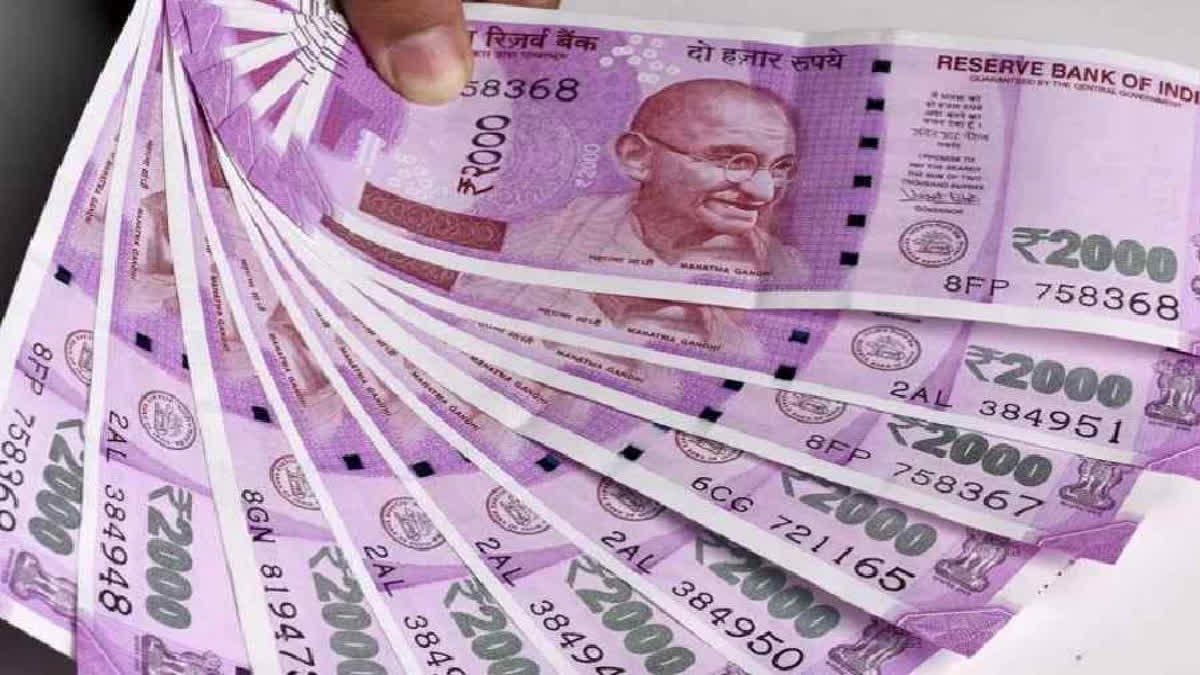Mumbai: In a surprise move, the Reserve Bank on Friday announced withdrawal of Rs 2,000 currency notes from circulation but gave public time till September 30 to either deposit such notes in accounts or exchange them at banks. Unlike the November 2016 shock demonetisation when old Rs 500 and Rs 1,000 notes were invalidated overnight, the Rs 2,000 notes will continue to be a legal tender till September 30.
In a statement, the Reserve Bank of India (RBI) said it has asked banks to stop issuing Rs 2,000 notes with immediate effect. While the RBI did not specify a limit for depositing the Rs 2,000 currency notes in bank accounts, exchange of a maximum of Rs 20,000 (10 notes of Rs 2,000) for other currency notes will be allowed at a time.
The move comes amid concerns of the highest denomination notes being used to hoard black money. The RBI had stopped printing Rs 2,000 notes in 2018-19 and the notes were rarely in circulation. The Rs 2,000 denomination bank note was introduced in November 2016, primarily to meet the currency requirement of the economy in an expeditious manner after the withdrawal of legal tender status of all Rs 500 and Rs 1,000 bank notes in circulation at that time.
The RBI said it has also been observed that Rs 2,000 denomination note is not commonly used for transactions. Further, the stock of bank notes in other denominations continues to be adequate to meet the currency requirement of the public, it added. "In view of the above, and in pursuance of the 'Clean Note Policy' of the Reserve Bank of India, it has been decided to withdraw the Rs 2,000 denomination bank notes from circulation," the RBI said.
The bank notes in Rs 2,000 denomination will continue to be a legal tender, it added. The central bank has asked the public to deposit Rs 2,000 bank notes into their bank accounts and/or exchange them into banknotes of other denominations at any bank branch. "Members of the public are encouraged to utilise the time up to September 30, 2023 to deposit and/or exchange the Rs 2,000 bank notes," the central bank said.
Deposit into bank accounts can be made in the usual manner, that is, without restrictions and subject to extant instructions and other applicable statutory provisions, it said. "In order to ensure operational convenience and to avoid disruption of regular activities of bank branches, exchange of Rs 2,000 bank notes into bank notes of other denominations can be made up to a limit of Rs 20,000 at a time at any bank starting from May 23, 2023," the RBI said.
To complete the exercise in a time-bound manner and to provide adequate time to the members of public, the RBI has asked all banks to provide deposit and/or exchange facility for Rs 2,000 bank notes until September 30, 2023. Also, the facility for exchange of Rs 2,000 bank notes up to the limit of Rs 20,000 at a time shall also be provided at the 19 Regional Offices (ROs) of RBI having Issue Departments from May 23, 2023.
As per the RBI, about 89 per cent of the Rs 2,000 denomination banknotes were issued prior to March 2017 and are at the end of their estimated life span of 4-5 years. The total value of such banknotes in circulation has declined from Rs 6.73 lakh crore at its peak as on March 31, 2018 (37.3 per cent of notes in circulation) to Rs 3.62 lakh crore constituting only 10.8 per cent of notes in circulation as on March 31, 2023. In January 2014, the RBI announced withdrawal from circulation all bank notes issued prior to 2005.
Following are the highlights
* Rs 2,000 currency notes to continue to be legal tender till September 30.
* Rs 2,000 notes with public can be deposited in bank accounts or exchanged at banks and RBI's 19 Regional Offices
* Deposits of Rs 2,000 notes into bank accounts can be made without restrictions subject to compliance with extant Know Your Customer (KYC) norms and other requirements
* Public can exchange Rs 2,000 notes up to to a limit of Rs 20,000 at a time beginning May 23
* Exchange of Rs 2,000 notes can be done via banking corespondents for up to Rs 4,000 per day for an account holder
* Rs 2,000 note was introduced after demonetisation in November 2016
* Unlike 2016 demonetisation, Rs 2,000 notes will continue to be a legal tender till September 30
* The withdrawal follows Rs 2,000 notes being reportedly used for hoarding black money and money laundering
* RBI had stopped printing of fresh Rs 2,000 notes since 2018-19
* About 89 per cent of the Rs 2,000 notes were issued prior to March 2017
* The total value of these bank notes in circulation declined from Rs 6.73 lakh crore at its peak as on March 31, 2018 (37.3 per cent of notes in circulation) to Rs 3.62 lakh crore (10.8 per cent of notes in circulation) as on March 31, 2023.



